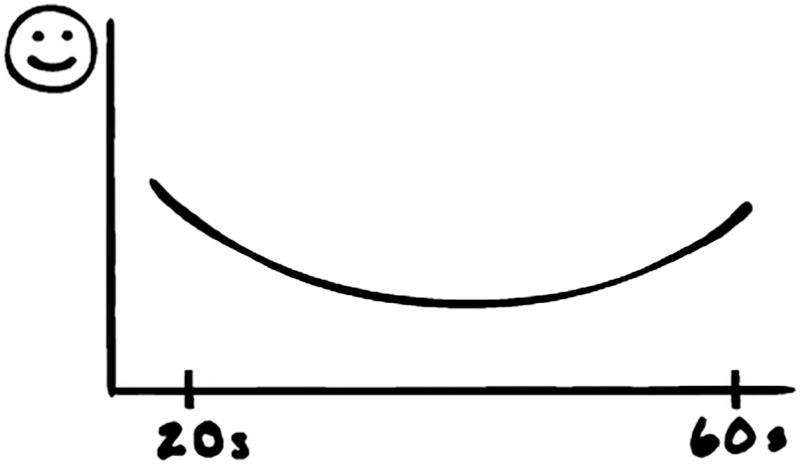The Basics

Everyone Knows Happiness, Stress, Tragedy
Your childhood, teens, and college years are the stuff of Han Solo, beer, road trips, random sexual encounters, and self-discovery. Pure magic. From your mid-twenties through your mid-forties, though, shit gets real—work, stress, and the realization that, despite what your teachers and your mom told you, you likely won’t be a senator or have a fragrance named after you. As you age, the stress of building the life you’ve been told you deserve, and are capable of, takes a toll. Also, somebody you love gets sick and dies, and the harshness of life comes into full view.
Then, in your fifties (earlier if you’re soulful), you begin to register all the wonderful blessings that are everywhere.1 I mean everywhere. Beautiful beings that look and smell like you (children). Water that turns into waves you can ride and other wonders of nature. The ability to deliver some sort of sweat or intelligence that people will pay you for, that you can then support your family with. The chance to travel across the surface of the atmosphere at near the speed of sound so you can see amazing things extraordinary people have built. And when tragedy strikes, many times the tragedy is beaten back by our best ideas: science. You recognize that your time here is limited, start smelling the roses, and begin affording yourself the happiness you deserve.
So if in adulthood you find you’re stressed, even unhappy at times, recognize that this is a normal part of the journey and just keep on keepin’ on. Happiness is waiting for you.2

Work It While You’re Young
We all know somebody who’s successful, in great shape, plays in a band, is close with their parents, volunteers at the ASPCA, and has a food blog. Assume you’re not that person. Balance when establishing your career, in my view, is largely a myth. “Struggle porn” will tell you that you must be miserable before you can be successful. This isn’t true: you can experience a lot of reward along the way to success. But if balance is your priority in your youth, then you need to accept that, unless you are a genius, you may not reach the upper rungs of economic security.
The slope of the trajectory for your career is (unfairly) set in the first five years post-graduation. If you want the trajectory to be steep, you’ll need to burn a lot of fuel. The world is not yours for the taking, but for the trying. Try hard, really hard.
I have a lot of balance now. It’s a function of the lack of it in my twenties and thirties. From twenty-two to thirty-four, other than business school, I remember work and not much else. The world does not belong to the big, but to the fast. You want to cover more ground in less time than your peers. This is partially built on talent, but mostly on strategy and endurance. My lack of balance as a young professional cost me my marriage, my hair, and arguably my twenties. There’s no user manual here, and it’s a trade-off. My lack of balance, while affording me more balance later in life, came at a very real cost.

Sweat
The ratio of time you spend sweating to watching others sweat is a forward-looking indicator of your success. Show me a guy who watches ESPN every night, spends all day Sunday watching football, and doesn’t work out, and I’ll show you a future of anger and failed relationships. Show me someone who sweats every day and spends as much time playing sports as watching them on TV, and I’ll show you someone who is good at life.3